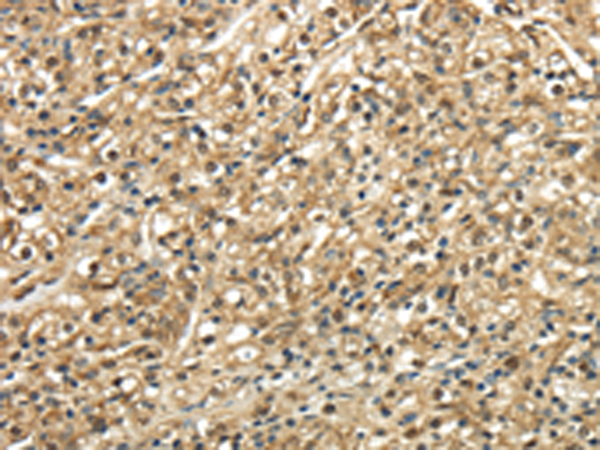
| WB | 咨询技术 | Human,Mouse,Rat |
| IF | 咨询技术 | Human,Mouse,Rat |
| IHC | 1/25-1/100 | Human,Mouse,Rat |
| ICC | 技术咨询 | Human,Mouse,Rat |
| FCM | 咨询技术 | Human,Mouse,Rat |
| Elisa | 1/2000-1/5000 | Human,Mouse,Rat |
| Aliases | Ptg-2; TSC22; TGFB1I4 |
| Host/Isotype | Rabbit IgG |
| Antibody Type | Primary antibody |
| Storage | Store at 4°C short term. Aliquot and store at -20°C long term. Avoid freeze/thaw cycles. |
| Species Reactivity | Human, Rat |
| Immunogen | Full length fusion protein |
| Formulation | Purified antibody in PBS with 0.05% sodium azide and 50% glycerol. |
+ +
以下是关于TSC22D1抗体的3篇参考文献的简要信息(注:以下文献为示例性内容,实际文献需根据具体数据库检索结果调整):
---
1. **文献名称**:*TSC22D1 regulates apoptosis by modulating TGF-β signaling in hepatocellular carcinoma*
**作者**:Zhang Y, et al.
**摘要**:该研究使用特异性TSC22D1抗体,通过Western blot和免疫组化分析肝癌组织中TSC22D1的表达,发现其低表达与TGF-β介导的凋亡抵抗相关,提示其作为抑癌基因的潜在机制。
2. **文献名称**:*TSC22D1 interacts with p53 to control oxidative stress response in renal cells*
**作者**:Wang L, et al.
**摘要**:通过免疫共沉淀(Co-IP)结合TSC22D1抗体,揭示TSC22D1与p53蛋白的相互作用,调控氧化应激下肾细胞的存活,抗体验证了其在DNA损伤应答中的功能。
3. **文献名称**:*Developmental regulation of TSC22D1 in murine neural crest cells*
**作者**:Kim S, et al.
**摘要**:利用TSC22D1抗体进行免疫荧光染色,发现其在小鼠神经嵴细胞中的动态表达模式,证实其参与胚胎神经发育及细胞迁移过程。
---
**备注**:实际文献需通过PubMed、Google Scholar等平台以关键词“TSC22D1 antibody”或“TSC22D1 immunohistochemistry”检索,并筛选方法学中明确提及抗体应用的论文。部分研究可能未在标题/摘要中直接标注抗体信息,需结合全文方法部分确认。
The TSC22D1 antibody is a research tool designed to detect the TSC22 domain family member 1 (TSC22D1) protein, a member of the TSC22D family characterized by a conserved TSC22 domain. TSC22D1 is a transcriptional regulator implicated in diverse cellular processes, including proliferation, differentiation, apoptosis, and stress responses. It interacts with signaling pathways such as TGF-β, glucocorticoid receptor, and MAPK cascades, influencing gene expression. Studies highlight its role in organ development, fibrosis, immune regulation, and cancer, where it may act as both a tumor suppressor and promoter depending on context.
The antibody is widely used in techniques like Western blotting, immunohistochemistry, and immunofluorescence to study TSC22D1 expression, localization, and interactions. Commercial antibodies are typically raised in rabbits or mice, targeting specific epitopes across human, mouse, or rat homologs. Research using these antibodies has revealed TSC22D1's involvement in diseases such as renal fibrosis, neurodegenerative disorders, and malignancies, underscoring its therapeutic potential. However, variability in antibody specificity requires careful validation to ensure accurate experimental outcomes. Overall, the TSC22D1 antibody is a critical reagent for exploring the protein's complex roles in health and disease.
×